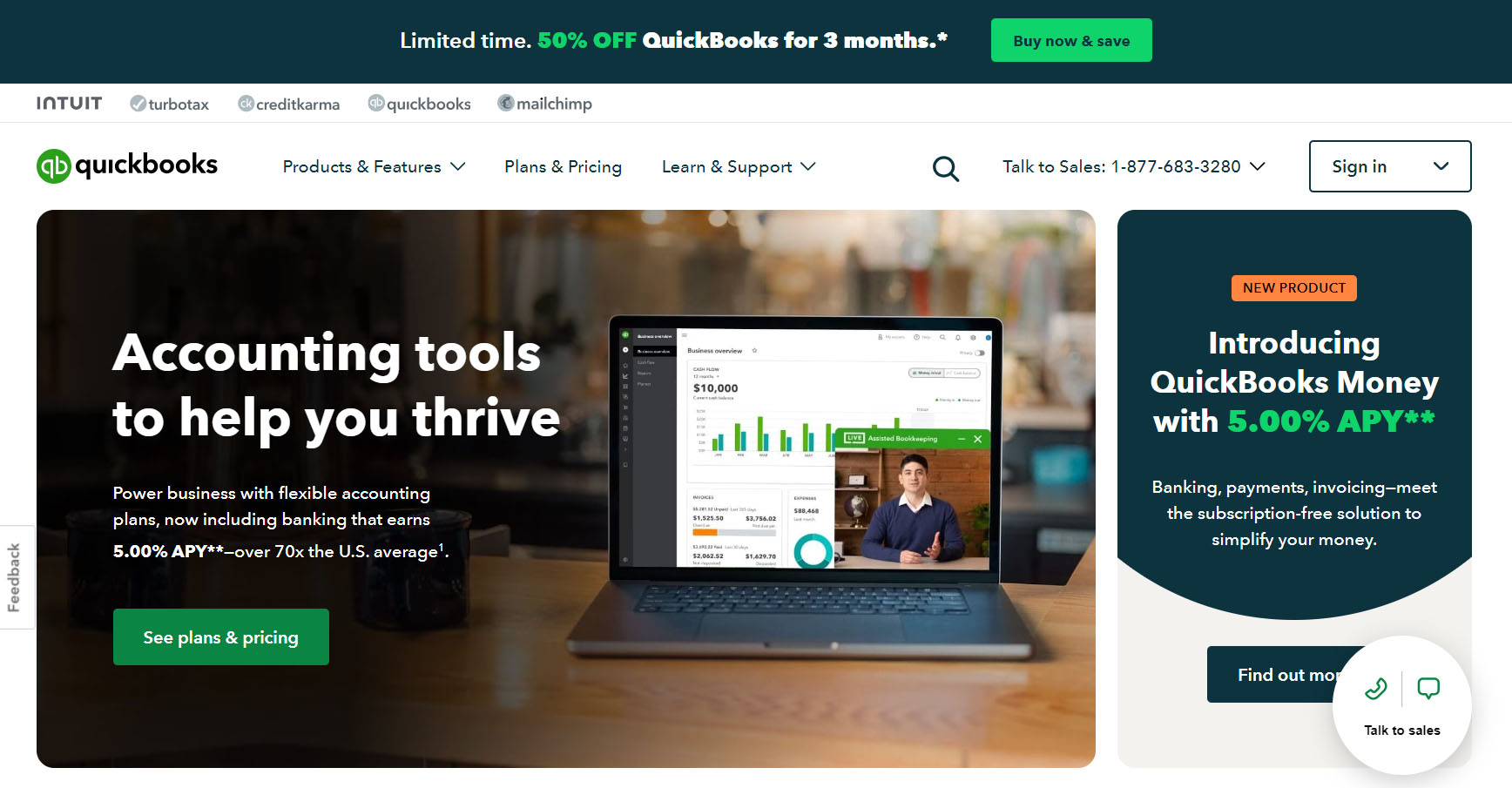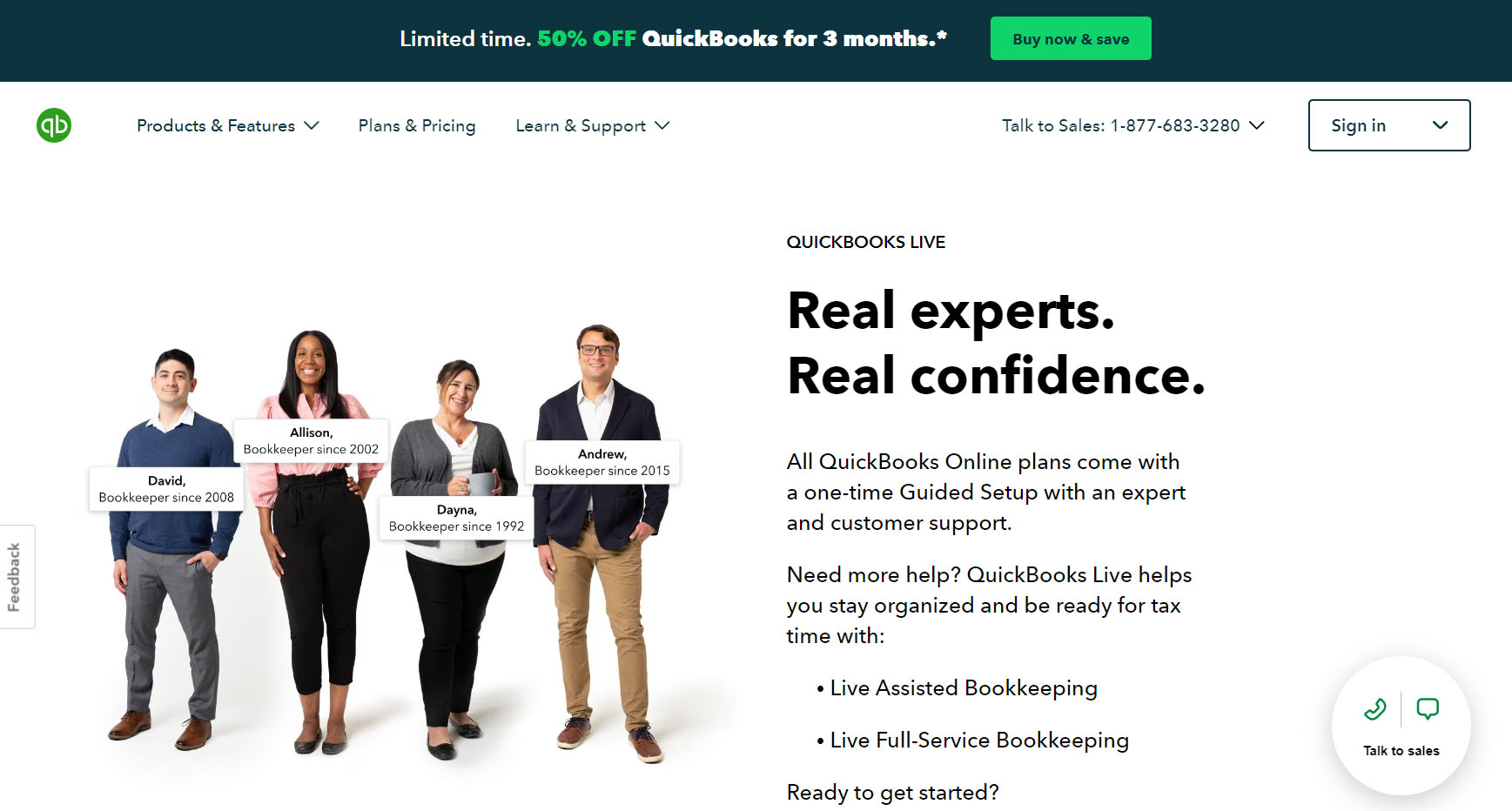QuickBooks Review: Our Verdict
- QuickBooks Review: Who QuickBooks Is Best For
- QuickBooks Review: Who QuickBooks Isn’t Right For
- QuickBooks Review: What QuickBooks Offers
- QuickBooks Review: Where QuickBooks Stands Out
- QuickBooks Review: Where QuickBooks Falls Short
- QuickBooks Review: Alternatives to QuickBooks
- QuickBooks Review: Customer Reviews
Pro Tips
Recap
QuickBooks Review: Our Verdict

QuickBooks Online is a powerful and versatile accounting software that can handle the needs of various small businesses. Whether you need to track your income and expenses, send invoices and accept payments, manage your inventory and projects, or prepare your taxes, QuickBooks Online has a plan for you. You can also access your data from any device, integrate with hundreds of apps, and share your files with your bookkeeper or accountant.
However, QuickBooks Online is not perfect. It can be expensive, especially for the higher-tier plans. It can also be confusing to learn and use, especially when it comes to correcting errors or customizing reports. It also has limited support options, depending on your plan and location. Therefore, before you decide to use QuickBooks Online, weigh the pros and cons, compare the alternatives, and take advantage of the free trial to see if it suits your business.
QuickBooks is a product of Intuit, Inc., a global company that provides financial software and services. Intuit has a global presence with offices in multiple countries including the United States, Canada, the United Kingdom, France, Israel, India, and Australia. However for support on QuickBooks, visit the support page to chat with a support expert, get a callback, or ask the community. You can also call 1-888-682-0807 for sales or 1-844-430-4608 for product support.
Pros
- It is user-friendly, compatible, and integrable with other software and services.
- It offers extensive features and functionality for various aspects of business finance.
- It has a large market share and popularity among bookkeepers and accountants
Cons
- It does not handle complex revenue recognition processes, especially for SaaS businesses.
- It has limited reporting and budgeting capabilities, especially for fast-growing businesses.
- It has limited support and maintenance options, and users may experience long wait times and unresponsive agents.
- It has a learning curve for some features and functions, and may not be able to accommodate the specific needs and preferences of some users
>>> MORE: Sage 50 Invoicing Software Review
1. QuickBooks Review: Who QuickBooks Is Best For

Quickbooks is a good choice for you if you are a or an:
- WordPress user who wants to optimize landing pages without using complex or expensive tools.
- Online marketer who wants to increase conversions, leads, and sales by testing different elements of your landing pages, such as headlines, images, colors, and calls-to-action.
- Thrive Architect user who wants to leverage the power of A/B testing with your existing landing page templates and designs.
2. QuickBooks Review: Who QuickBooks Isn’t Right For
QuickBooks is not a good option for you if you:
- Seek a more affordable or free solution. QuickBooks can be expensive, especially for the higher-tier plans and the add-ons.
- Need extensive or reliable support. QuickBooks has limited support options, such as phone, chat, and email, and users may experience long wait times and unresponsive agents.
- Prefer a simple and intuitive interface. QuickBooks has a learning curve for some features and functions, such as corrections, reports, and customization
3. QuickBooks Review: What QuickBooks Offers
QuickBooks offers the following features:
- Income and expense tracking: QuickBooks makes it simple to keep track of your earnings and outlays. You can even link your bank and credit card accounts to receive updates automatically.
- Invoice and payment management: QuickBooks lets you create and send professional invoices, accept payments online, and keep track of the status of your invoices and payments.
- Tax deductions: It helps you optimize your tax deductions by automatically calculating and classifying your business expenses and providing reports and receipts for tax time.
- Comprehensive reports: QuickBooks gives you a range of reports and insights on the performance of your business, including profit and loss, balance sheets, cash flow, sales, and more.
- Receipt capture: It allows you to take a picture of your receipts with your phone, store it on your phone, and use the GPS function to track your mileage.
- Mileage tracking: It tracks your mileage automatically using the GPS.
- Inventory management: It helps you track costs, manage quantities, and update information across all your sales channels.
- Project profitability: QuickBooks lets you monitor project revenue and costs, as well as project profitability.
- Financial planning: It provides tools and advice to help you plan your company’s finances, including a cash flow planner, a business health dashboard, and smart money alerts.
- Integration with other applications and services: It integrates with numerous third-party apps and services, including PayPal, Shopify, Square, Stripe, and more, which enhances its usefulness and compatibility.
>>> PRO TIPS: Bill.Com Invoicing Software Review
4. QuickBooks Review: QuickBooks Details

Ideal for
- Freelancers
- Independent contractors
- WordPress users
- Online marketers
- Thrive Architect users
Plans and pricing
- Self-Employed: This plan suits you as a freelancer and independent contractor who needs to track income and expenses, send invoices and quotes, capture receipts, and calculate tax deductions. It costs $15 per month, but you can get 50% off for the first three months or a 30-day free trial.
- Simple Start: This plan is suitable for managing cash flow, sending invoices and payments, connecting bank accounts, and generating reports for your small businesses. It costs $30 per month, but you can get 50% off for the first three months or a 30-day free trial.
- Essentials: This plan is ideal for you if you have a growing business and need to manage its bills and payments, track employee time, and access more features and users. It costs $60 per month, but you can get 50% off for the first three months or a 30-day free trial.
- Plus: This plan is perfect for tracking the inventory, projects, and profitability, and creating budgets and forecasts for larger businesses. It costs $90 per month, but you can get 50% off for the first three months or a 30-day free trial.
- Advanced: This plan is for businesses that need advanced functionality, such as custom access controls, workflow automation, data restoration, revenue recognition, and premium integrations. It costs $200 per month, but you can get 50% off for the first three months or a 30-day free trial.
Functionality
QuickBooks Online enables centralized management of your business finances across all devices. By linking your bank and credit card accounts, you can import and classify transactions, make and send invoices, process online payments, monitor sales tax, prepare for tax filing, and provide diverse reports and analyses.
Additionally, you have the option to streamline certain operations, such as generating invoices, making bill payments, and conducting reconciliations, to optimize efficiency and minimize mistakes. QuickBooks Online facilitates inventory tracking, project management, cash flow monitoring, and business financial planning.
Integrations
Here are some of the integrations that QuickBooks offers:
- PayPal
- Shopify
- Square
- Stripe
- Etsy
- Amazon
- eBay
- com
- HubSpot
- Salesforce
5. QuickBooks Review: Where QuickBooks Stands Out
QuickBooks stands out from other A/B testing tools in the following ways:
- Market share and popularity: QuickBooks is the industry standard for small-business accounting software, with over 7 million users worldwide and 94.2% of the US market share as of 2008. It is a popular choice among bookkeepers and accountants due to its widespread usage and reputation making it easy to share and collaborate on financial data.
- Extensive features and functionality: QuickBooks handles income and spending monitoring, invoicing and payments, tax deductions, reporting, receipt capture, mileage tracking, inventory management, project profitability, financial planning, and more. Businesses that need more capability can use QuickBooks’ custom access controls, workflow automation, data restoration, revenue recognition, and premium connectors.
- Integration with other applications and services: QuickBooks is compatible with over 750 business apps, including PayPal, Shopify, Square, Stripe, Etsy, Amazon, eBay, and more. These interfaces help you synchronize data from sales channels, payment platforms, e-commerce sites, and other services to see all your income and expenses. You can also handle time, payroll, invoicing, and projects from one spot.
6. QuickBooks Review: Where QuickBooks Falls Short

Some of the areas where QuickBooks falls short are:
- Revenue recognition: QuickBooks cannot handle sophisticated revenue recognition processes, especially for SaaS subscription organizations. After sending the invoice, QuickBooks tracks revenue regardless of payment date or performance obligations. This may violate GAAP and ASC 606. SaaS companies may need distinct paperwork or spreadsheets to modify revenue based on contractual obligations.
- Reporting and budgeting: QuickBooks lacks reporting and budgeting features, especially for fast-growing enterprises that need more analysis. QuickBooks customers generally use spreadsheets for reporting, which is time-consuming, error-prone, and inefficient. QuickBooks cannot create custom reports, aggregated charts of accounts, budgets, forecasts, or advanced financial statements.
- Support and maintenance: QuickBooks has minimal phone, chat, and email support, with excessive wait times and unresponsive operators. Regular QuickBooks upgrades and backups are costly and disruptive. You may experience data accessibility, imbalances, troubleshooting, and security difficulties.
- User interface and functionality: QuickBooks offers a straightforward setup and interface, but adjustments, reports, and customization require some training. You may struggle to use some features or not be able to use them. QuickBooks offers little customization and flexibility, therefore it may not meet some of your demands..
>>> GET SMARTER: ZipBooks Accounting Software Review
7. QuickBooks Review: Alternatives to QuickBooks
Here are some of the alternatives to the QuickBooks that you can also consider:
- FreshBooks: FreshBooks is a cloud-based accounting software that focuses on invoicing and billing, ideal for freelancers and service-based businesses. FreshBooks has a lower starting price than QuickBooks, but fewer features and integrations. FreshBooks has better customer support and a simpler interface than QuickBooks.
- Wave: Wave is a free cloud-based accounting software that covers basic accounting needs, such as income and expense tracking, invoicing, and receipt scanning, suitable for sole proprietors and small businesses. Wave has no subscription fees, but charges transaction fees for payments and payroll. Wave has fewer features and integrations than QuickBooks, but a more intuitive interface and a faster setup.
- Xero: Xero is a cloud-based accounting software that offers a comprehensive and flexible solution for small and medium-sized businesses. Xero has a similar pricing and feature range as QuickBooks, but more integrations and users. Xero has a steeper learning curve and a less user-friendly interface than QuickBooks, but a better customer support and a more customizable platform
- Sage Business Cloud Accounting: Sage Business Cloud Accounting is a cloud-based accounting software that provides a simple and easy way to manage your business finances, such as cash flow, invoicing, taxes, and reports. Sage Business Cloud Accounting has a lower starting price than QuickBooks, but less functionality and scalability. Sage Business Cloud Accounting has a user-friendly interface and a reliable support than QuickBooks.
- NetSuite: NetSuite is a cloud-based enterprise resource planning (ERP) software that integrates accounting, inventory, sales, marketing, and more. NetSuite is designed for large and complex businesses that need a powerful and customizable solution. NetSuite has a higher starting price than QuickBooks, but more features and capabilities. NetSuite has more advanced functionality and automation than QuickBooks
QuickBooks Review: Customer Reviews
QuickBooks has 1,140 reviews and an average rating of 1.0 out of 5 stars on ConsumerAffairs, 4.5 out of 5 stars on NerdWallet and 8.1 out of 10 from 1,744 reviews on TrustRadius.
The customer reviews and ratings on different websites reflect the mixed opinions and experiences of QuickBooks users. Some users are cool with the functionality, compatibility and market share of QuickBooks, while others complain about its expense, support, and complexity. Some users also encounter issues with revenue recognition, reporting, migration and user interface.
>>> GET SMARTER: Xero Invoicing Software Review
Pro Tips
Here are some pro tips to get the best from QuickBooks:
- Use keyboard shortcuts: Keyboard shortcuts can save you time and reduce repetitive tasks by allowing you to perform common actions with a few keystrokes. For example, you can use Ctrl+I to create an invoice, Ctrl+Q to generate a quick report, or Ctrl+W to open the write checks window.
- Connect your bank and credit card accounts: Online banking, also known as bank feeds, is one of QuickBooks’ most helpful and time-saving features. When you connect your bank and credit card accounts, QuickBooks downloads and categorizes your transactions automatically, and you only need to approve the work.
- Customize your invoices and reports: QuickBooks allows you to customize your invoices and reports to suit your business needs and preferences. You can change the layout, design, logo, colors, fonts, and fields of your invoices and reports, and add or remove information as needed.
- Use the mobile app: QuickBooks has a mobile app that lets you access your data and perform tasks on the go. You can use the app to create and send invoices, capture and organize receipts, track mileage, view reports, and more.
- Explore the integrations and add-ons: QuickBooks integrates with over 750 popular business apps, such as PayPal, Shopify, Square, Stripe, and more. These integrations allow you to sync data from your sales channels, payment platforms, e-commerce sites, and other services, and enhance your functionality and compatibility.
Recap
QuickBooks Online is a widely used accounting software that offers a range of features to help you effectively manage your small business finances. There is a wide range of features, plans, and integrations available to cater to various needs and budgets.
On the other hand, there are a few downsides to consider, including the higher price point, the need for a bit of a learning curve, and the limited support available. It is important to thoroughly assess your choices and take advantage of the free trial before committing to QuickBooks Online.













